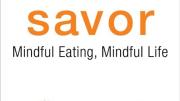In their new book, Savor: Mindful Eating, Mindful Life (HarperOne, 2010), Vietnamese Buddhist monk Thich Nhat Hanh and nutritionist Lilian Cheung, a lecturer at the Harvard School of Public Health, apply ancient Buddhist mindfulness techniques to eating in the modern world. “It is not just what we consume, but how we eat, when we eat, why we eat, and whom we eat with that makes a difference,” says Cheung, who grew up in a Buddhist home in Hong Kong. A longtime student of Hanh’s work, Cheung years ago saw an opportunity to weave together Buddhist wisdom with modern nutritional science, and suggested that she and Hanh collaborate on a book. “We nutritionists can talk all we want about the best diets,” she says, but until people understand the physical, psychological, cultural, and environmental factors that make us binge, “they will almost always continue to overeat.”
The key to healthful eating, she says, is mindfulness, the ancient Buddhist art of paying attention and living in the moment—a state best achieved through regular practice of conscious breathing and meditation. “When we eat and our mind is aware of each bite, savoring the taste and the nourishment it gives us, we are already practicing mindfulness,” Cheung and Hanh write. This definition differs slightly from Ellen Langer’s nonmeditational version, but the two share a central tenet: people who pay attention to new things in the present can effect change at any time.
Often, we become trapped in cycles of guilt, Cheung explains, anxious about what we ate, what we failed to do. “Each minute we spend worrying about the future and regretting the past is a minute we miss in our appointment with life,” the authors write. By applying the four noble truths of Buddhism to our eating habits—that we have suffering in our lives (our excess weight); that we can identify the causes of our suffering (too many sugar-sweetened beverages, mindless television watching, emotional eating); that healing is possible (negative habits can be changed); and that there are paths to free us from our pain (mindfulness)—“people can better navigate the factors that affect their weight,” says Cheung.
Together, Cheung and Hanh offer a primer on psychological and spiritual health, as well as a practical nutritional guide to healthier eating. What we eat is as important as our relationship with food, Cheung explains. As she and Hanh write in their book, “It is the awareness of the present moment, the realization of why we do what we do, that enables us to stop feeling bad and start changing our behavior.”








